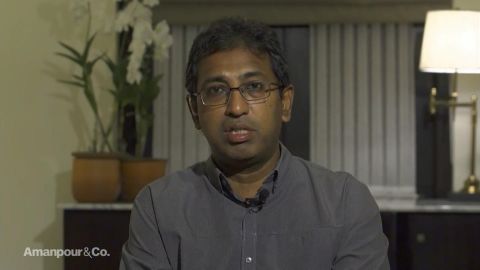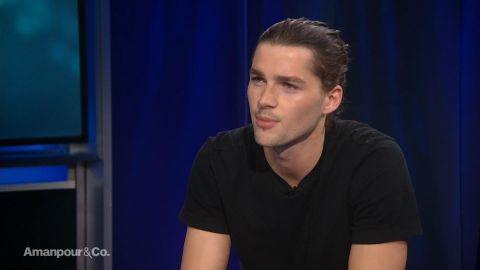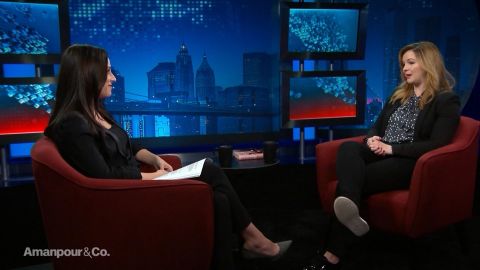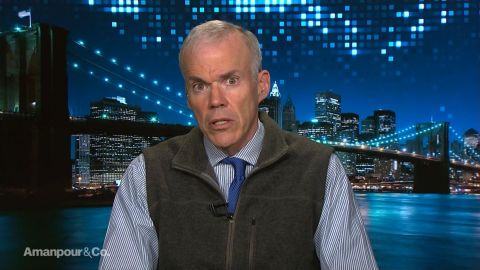Read Transcript EXPAND
CHRISTIANE AMANPOUR: Now, our next guest has dedicated herself to another reckoning in society and that’s the Me Too movement. The actress Amber Tamblyn grew up in Hollywood starring in TV hits such as “General Hospital” and “Joan of Arcadia,” and in the film beloved by teens, “Sisterhood of the Traveling Pants.” But her coming of age was marked by a growing awareness of the toxic environment facing women in the industry, a journey she details in her new book, “Era of Ignition”, and she tells our Alicia Menendez how she went from actor to feminist activist.
ALICIA MENENDEZ: Amber, thank you so much for being here with us today.
AMBER TAMBLYN, AUTHOR “ERA OF IGNITION”: My pleasure. Happy to be here with you Alicia.
MENENDEZ: So tell me what does it mean, an “Era of Ignition?”
TAMBLYN: The era of ignition for me is this time of really palpable trajectory and movement that we are all going through together that doesn’t really have any answers or doesn’t really provide any roadmap for how we’re going to get on the other side of this huge moment for us culturally. And it’s a time that really comes after this great sort of national existential crisis. What happens when we evolve – whether going through our own personal existential crises or whether we’re confronting the ones that are happening to our country – what comes after that? What is the harnessed change that we are all so deeply rooted in right now?
MENENDEZ: Especially to your point because we’re trying to grapple with that out of cultural, societal level and at the same time we’re each, as an individual, trying to grapple with these questions.
TAMBLYN: Oh yes, 100 percent. I mean, what was so powerful in the writing of this book for me was, you know, looking at my own experiences growing up as a child actress. So I’m 35 now. I started acting when I was 11-years- old. I was on a soap opera for seven years, and I went into doing some other shows. I was on this show, “Joan of Arcadia,” and did a lot of acting roles for most of my life. But when I got into my 20s, I really had this personal existential crisis of feeling like I knew I had more to offer the world. I knew there were more things that I wanted to do. I wanted to write. I wanted to create. I wanted to be the arbiter and the creator of my own – of my own life and of my own creative work and my own creative visions.
In the book I talk about this idea of an invisible alphabet, this idea that we all sort of sometimes see ourselves at A and we see this beautiful, glowing Z in the distance, and we know that’s going to be us, but how do we manifest the letters in between? How do we find that language to become the person that we want to become? And so, I spent a large portion of my late 20s really dealing with that and getting to the point of the person that you see here now and I think that our country’s kind of going through a little bit of that itself.
MENENDEZ: You write about your experience as a child actor, coming out of that and realizing you were “broken.” I think that’s the word that you used. Why were you broken?
TAMBLYN: I was broken because I spent so many years only ever knowing how to walk into other people’s rooms, predominately rooms of men, because men were always the decision makers, have always been the decision makers in Hollywood in my industry. So I only ever know how to go in and interpret their words of their script or act a certain way as a character in a way that appealed to them, smile in the way that appealed to them, weigh the right amount that appealed to them. I really only ever know how to go into anybody else’s room but my own, because my own personal creative room didn’t necessarily exist in a certain point.
But the brokenness really came from feeling tired and exhausted with not only my status quo but the status quo and feeling stuck and not knowing how to move myself out of that experience, the experience of just going into other people’s rooms. And so, in that way, I was feeling – I had always felt kind of – kind of just like a guest in my own life, as opposed to a person who belonged there, a person who was the owner of that – of that living.
And so, from that brokenness, I think I really had to examine my part in that, especially as an adult. There’s only so much time that you can go — well, I’ve been doing this my whole life. I was a child actress. You know, I should — I deserve better. There’s more I want to do, and at a certain point, I had to take it on myself and say, “What am I doing to try and not break out of that?”
MENENDEZ: There’s another incident from your youth that I want to pick up on because I think it’s a thread that connects to the moment we’re in now. It’s your encounter with the actor, James Woods.
TAMBLYN: So in that particular case, the actor, James Woods, picked up on me when I was a teenager at a diner in Los Angeles, where I born and raised. And when I said this publicly, he said I was a liar. He accused me of lying, which normally is something that you would maybe have a debate about, or you would just shut up and be quiet and go, “I’ve said my peace. I’m going to leave it alone now.”
But I think in that moment, it was after Donald Trump had been elected. It was after this feeling of not only being so – so boxed out of my own experience and being told indefinitely that I was never — that I had to manage my expectations for my career, that I had to manage my expectation for my looks, that I just had to, you know, consider always taking second best for myself. Pressed against the image of a president who was now doing the same thing and being able to say whatever he wanted about women without any consequences.
And so something was triggered for me. Something in that moment was sort of weaponized for me, and that I felt like I had every right to be able to push back on someone, on an older man in a position of power, saying that I had lied, and to be able to push back on that and say I’m not a liar, and not only am I not a liar about this story, I am going to prove it, and I’m going to write about it, and I’m going to keep going further.
And I don’t – I don’t actually care what the consequences might be for me and my career, even though I know speaking out, traditionally in the entertainment business, before 2017’s Me Too movement, was very dangerous. It was like a very, very dangerous thing to do.
MENENDEZ: I think it continues to be dangerous, in the sense that I think we can publicly applaud women for their bravery and then quietly, in whispers, call her a problem.
TAMBLYN: Well, so much of what’s happening right now is you are seeing a lot of – a lot men and a lot of people in positions of power quietly whisper about how maybe they’re not going to interact so much with women anymore in the workplace or even hire them in the workplace because they’re afraid if they just, you know, just tap them on the back that they’ll get accused of something they didn’t intend to do.
And we’re not going to know how to handle it and deal with it, so their way of doing that is to just sort of step away and push back from it. But that’s okay. All of these things happening are important, and it’s okay to know that the part that all of this chaos that we’re feeling, this sense of it’s not over, things are still happening.
There is still a reckoning. And we have to remember that no civil rights movement was ever comfortable. At no time when – in our nation’s history, or, you know, I’m sure in the world as well, was there a huge systemic cultural change. a change around the way in which people treated each other and valued each other and their livelihood and their work.
In no way, at no time was that ever comfortable or easy. Part of what makes this so great is how difficult it is, how – you know, the hard conversations we’re having to have, whether that’s, you know, white women having to own white feminism and inabilities to sort of see what real intersectional feminist work, whether that is men feeling like they’re being attacked because – you know, that they feel they’re being pushed out of rooms and conversations and that there’s going to be this sort of large witch hunt, which is a term that’s used a lot.
I think that it’s OK for all of this to be happening because out of this chaos is going to come some kind of clarity. It may not come immediately, but people are really finding out where they fit and where they fit and where they want to land in this discussion.
MENENDEZ: Right. You keep raising this point, which I think is really interesting, is where men fit into this moment and into this debate, and in some ways this is not just theoretical for you. I mean, you, in the context of your own marriage, have grappled with what this moment means.
TAMBLYN: My husband is a standup comedian. His name’s David Cross, and we’ve been together for 11 years. And I know for him and for a lot of his friends, they’ve never had to think twice about jokes that they’ve told or the ways in which they’ve told those jokes. They’ve never had to question it. And that’s their privilege and that’s also part of what makes their art so powerful is that no one has every stepped in and said publicly, “this has hurt me.” So my husband has had to deal with finding out his way and figuring out his way along with, I think, a lot of the other men that I know, that I love and care about.
MENENDEZ: In one case, a very public incident.
TAMBLYN: Yes, a very public incident where another comedian accused him of being racist, of saying racist things, and he had to come to real terms with the way in which he tells jokes, the way in which he talks to other people. You know, something you might say to your friends, who are like a Zach Galifianakis or a Michael Cera, might not be acceptable for someone who’s a young, Asian-American comedian and a woman.
You have to understand the context in which you are saying things, and part of our own self examination and part of what’s so beautiful and why I love him is he was able to take on that self examination and to be able to sort sit with himself and this failure and say, “how can I grow from this? I don’t think I know. I don’t really have the answers, but I’m interested and I’m curious.” And the curiosity is so important for us not to just sort of put up our guard and put up our defenses and to act from our defenses.
MENENDEZ: And in the midst of that conversation, there were a lot of accusations of you as a white feminist which forced you to grapple internally and externally with what that meant.
TAMBLYN: Yes, and those demands were fair because people were saying you cannot be the head of this. You cannot come out and say these things are unfair and, you know, be apart of Time’s Up and be apart of this, you know, public moment in time without saying something, without giving us some context, which is why I didn’t shy away from it in the book. And I write pretty openly about my experience talking with my husband. I also did this
I want to say because I don’t want people to feel alone in their own conversations with their husbands, they’re brothers, their fathers. I talk to so many women and some men, too, who are going through this experience, especially in heterosexual couples and relationships where they’re having really difficult, painful conversations about the ways in which we have not felt sort of unseen or not listened to. Having these conversations with the men in our lives is not easy right now. It’s very hard, and I don’t know a woman whether she’s famous or my mother or, you know, anybody in between who has not had some conversation with their partner that has been very hard. And so, I shared a lot of that in the book because I wanted people to know that it’s no different for me.
MENENDEZ: If you’re woman who’s just going into your nine to five where you need that paycheck, do you have the luxury of being an agent of radical change?
TAMBLYN: That’s a great question. So I think what we have now, as far as being an agent of radical change and taking that on in our own personal experiences, is that we have ally ship and we have community. And when you have strength in numbers like that, you can change anything. I know that might sound hopefully optimistic and maybe a little not true, but I think it’s very true. I think one of the things, for instance, the inception of Time’s Up came from a lot of women being really angry, and not just women in the entertainment business.
You had, you know, women in the Farm Worker’s Union, you had activists like Monica Ramirez, and Ai-jen Poo, and Tarana Burke. You had women across sectors, across industries saying we’re done with what’s happening in our communities and we’re going to reach out to each other and create this really strong, powerful bond in which we can all help and work together to change this. So for – in the actress community in specific in my experience, which I know is an experience of privilege, but even to be able to get into rooms together with women who you never would normally be in a room with without a man there. So you never had conversations devoid of the male perspective.
MENENDEZ: Right. That part of the book as well that you sort of look around at each other and you’re like, “so who’s going to run this meeting?”
TAMBLYN: That’s right. You’re like – but also, what can we say? What can we not say? Like it’s weird. It’s a very strange experience, and I’ve had so many young women ask me this on this book tour, “I’m a waitress. There’s this one guy that always comes in who will always like give me a pat on the butt. And my boss is not great either and is — how do I — what do I do? How do I get out this situation and get this guy to stop, with a boss who’s not supportive, who would probably just tell me to essentially shut up and take it?” And my advice to her was to remember two things.
One, there’s got to be other people in that workplace that are experiencing something similar whether it’s with the boss or with a customer. Maybe you need to get together with this specific aim to talk to them and bring them onboard and create a small collision even if it’s two people, three people.
And then the second thing I would just remind people always is that no one — no business likes things in writing. No establishment like to see something in writing, it’s scary. It’s really scary because that is a literal paper trail of harassment. That is a paper trail of behavior and also of people not doing their jobs, not taking in to account your wellbeing, your safety. So put something in writing. Put a letter together whether it’s — and have it signed by whoever you can have sign it. But the support together in one document so that you have it there and state what it is that you need an that you’re looking for whether that’s the behavior to end, whether you’re looking for more support no matter what it is.
MENENDEZ: You’re a big Hilary Clinton surrogate, bi Hilary Clinton supporter twice over. And now in this race we have at least four major candidates that happen to be women. Have we in the media learned our lesson? Do we know how to cover them correctly this time around?
TAMBLYN: I will say that it is interesting to me that even though we do have incredibly capable, amazing women running on the democratic tickets right now, they are still not at the top of who’s getting the donors who’s getting funding, who’s getting money. And they’re also not really seen as front runners.
It always ends up being about well here’s a really capable man that has the best policies for women. Here’s the most capable man who has — who will create the best laws for women, who will help to help push congress and the senate to support more women, who will help with — fill in the blank.
But it always ends up being that the visualization of female empowerment stems still from a patriarchal voice. And that’s a problem. And that’s a problem that we have to continue to grapple with. Everyone talked about how they wanted a woman to be president but not that woman.
I always wonder — I say OK, but what — then not that woman, than what kind of woman? What is the pedestal? What does it look like? What does she have to have? There’s a long list joke in this nook where I talk about requirements for becoming a candidate for president of the United States if you’re a woman.
And the list goes on for like ten pages. It’s got all these addendums. It’s got all these sub lines, some category lists, emotions are illegal, having your period’s illegal, talking above a certain decibel is illegal. It’s a joke but also it’s not a joke because one of the biggest problems that we have is that this is not just about saying who’s the right woman. It’s about not seeing women in totality as being worthy of these positions. We still have a problem visualizing it and seeing it.
And until — truly until a mediocre woman can become president in the way that mediocre men have been presidents for the entire history of the United States of America, then we have a fundamental equality problem.
And that is a — it resounds in the mind, it’s part of what we have been thinking about when we think about women, is that they have to be so exceptional, they have to be so perfect, the standard is so high for them that that is all we will accept. And then even sometimes we won’t accept that either.
MENENDEZ: Amber, thank you so much.
TAMBLYN: Yes, my pleasure. Thank you.
About This Episode EXPAND
Christiane Amanpour speaks with Sri Lankan Minister of Economic Reforms Harsha de Silva about the recent bombings; Jack Harries about protest group Extinction Rebellion; and Bill McKibben about the future of climate change. Alicia Menendez speaks with actress Amber Tamblyn about her new book book “Era of Ignition.”
LEARN MORE



